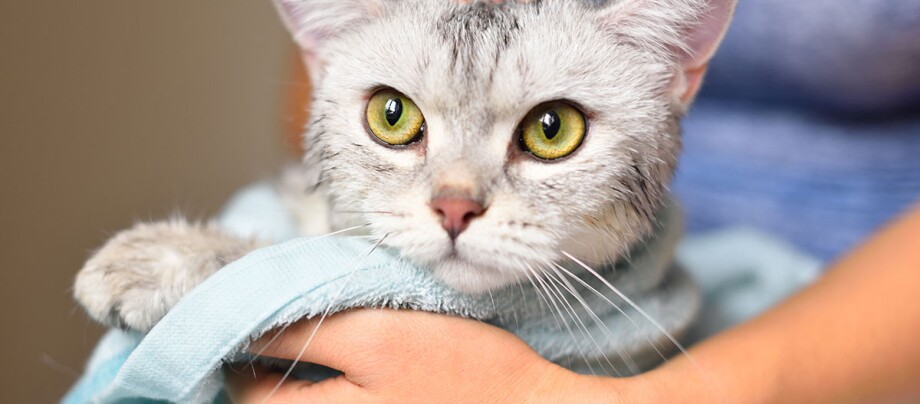Take Away the Fear of Water and Bathe Your Cat When You Want
14.11.2022 - Reading time: 4 minutes

Never mind washing your cat - they spend up to four hours a day on intensive grooming. Although house cats are very clean, they are known to be shy of water. With their rough tongues and the help of their paws, they manage to clean themselves thoroughly and easily even without water. Many cat owners wonder whether cats need to be bathed – and if so, how best to go about it.
When you should help cats with grooming
In principle, bathing a short-haired cat is not necessary, because it takes complete care of its body and coat on its own. Cat owners should only brush out loose hairs during the moulting season. Long-haired cats need regular support as their thick coat tends to become matted. Special attention should be paid to the area around the anus: To prevent droppings from getting stuck here, it is advisable to trim the hair around the genital area slightly. As a general rule, a longhaired cat should not be washed either.
Naked cats have very sensitive skin due to the lack of fur. They are protected by a sebaceous film, which cat owners should wipe off regularly with a lukewarm cloth. As a rule, however, a complete bath is not necessary.
If an outdoor cat comes home completely filthy, some cat owners consider whether they should give the cat a bath. As a rule, it is sufficient to wash off coarse dirt with a lukewarm, damp cloth. You should only think about giving your cat a full bath in exceptional cases, for example, if it is not possible to remove extremely stubborn dirt deposits.
Important vet visit in case of parasites or contact with toxic substances
Unfortunately, you can’t kill parasites with water: If the cat has fleas, for example, a bath is not enough. In this case, a visit to the vet is advisable. You can usually get a spot-on preparation that reliably eliminates the parasites.
If your cat has come into contact with something poisonous, you should remove the remains from its fur immediately using lukewarm cloths or a flannel. Bathing is not recommended in this situation, because if the animal is not used to being washed, you will only create additional stress. It is helpful to visit the vet, who can rule out any possibility that the cat may have come into contact with something poisonous. If in doubt, the vet will have the necessary equipment to clean the animal professionally.
Washing your cat: Here's how to do it
You should rarely – if ever – bathe a house cat. If you do bathe your pet for specific reasons, for example if it cannot clean itself due to illness or injury, you should create a calm and stress-free environment. Be well prepared and have everything you need at hand.
It is important to use only products suitable for animals, such as a cat shampoo that does not damage the natural protective film of the skin. If you do want to bathe the cat, ideally you should have a small bathtub with lukewarm water ready or use your shower tray. A non-slip mat is useful to ensure that the animal does not slip. A large bathtub is not a good choice, as there are too many places for it to escape. The room should be pleasantly warm so that the cat does not freeze when wet. You should also have a towel handy so you can pat your house cat dry immediately.
Bathing your cat - tips for getting it used to water
Cats are not particularly fond of water, so you can expect some resistance to your venture. A clever idea is to familiarise the animal with the water before the bath. Occasionally splash a little water on its paws or dip a paw into a bowl of water. In this way, you will take away the animal’s fear of the wet feeling in the long term and you will be able to bathe your cat when you need to.


